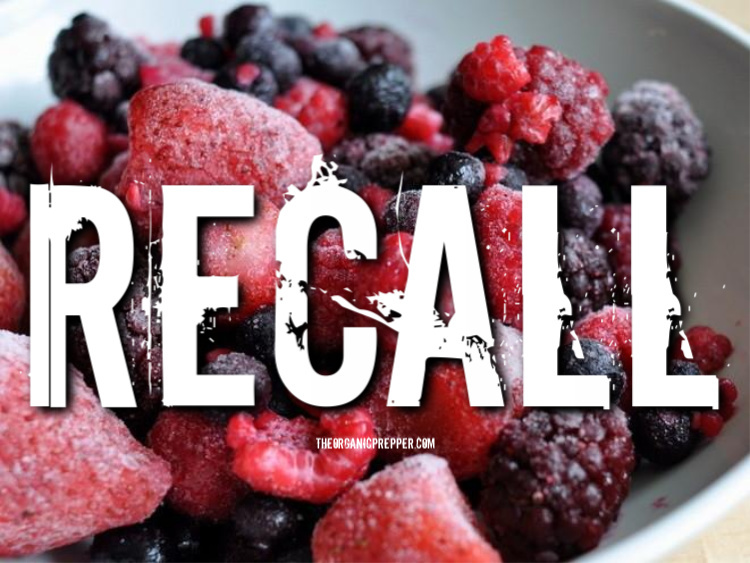If you're new here, you may want to subscribe to my RSS feed. Thanks for visiting!
Author of Be Ready for Anything and Bloom Where You’re Planted online course
Another week, yet another recall in the American food supply. Grocery stores across the country are pulling frozen berries from the shelves after the FDA discovered the presence of the Hepatitis A virus during routine testing. So far, no one has reported becoming ill.
Affected stores are
- Kroger
- Ralphs
- Dillons
- Smith’s
- King Soopers
- Fry’s
- QFC
- City Market
- Owen’s
- Jay C
- Pay Less
- Baker’s
- Gerbes
- Harris Teeter
- Pick ‘n Save
- Copps
- Metro Market
- Mariano’s
All the stores above are under the Kroger umbrella. The affected fruit is the Private Selection brand.
Here are the recalled items:
- PRIVATE SELECTION FROZEN TRIPLE BERRY MEDLEY, 48 OZ (BEST BY: 07-07-20; UPC: 0001111079120);
- PRIVATE SELECTION FROZEN TRIPLE BERRY MEDLEY, 16 OZ (BEST BY: 06-19-20; UPC: 0001111087808);
- PRIVATE SELECTION FROZEN BLACKBERRIES, 16 OZ (BEST BY: 06-19-20, 07-02-20; UPC: 0001111087809)
The FDA said:
Kroger has removed the potentially affected items from store shelves and initiated its customer recall notification system that alerts customers who may have purchased recalled products through register receipt tape messages and phone calls.
Customers who have purchased the above products should not consume them and should return them to a store for a full refund or replacement. (source)
What is Hepatitis A?
Hepatitis A is a virus that is often transmitted through an oral-fecal route.
Hepatitis A is a highly contagious liver infection caused by the hepatitis A virus. The virus is one of several types of hepatitis viruses that cause inflammation and affect your liver’s ability to function.
You’re most likely to get hepatitis A from contaminated food or water or from close contact with a person or object that’s infected. Mild cases of hepatitis A don’t require treatment. Most people who are infected recover completely with no permanent liver damage.
Practicing good hygiene, including washing hands frequently, is one of the best ways to protect against hepatitis…
…Hepatitis A signs and symptoms typically don’t appear until you’ve had the virus for a few weeks. But not everyone with hepatitis A develops them. If you do, hepatitis signs and symptoms can include:
- Fatigue
- Sudden nausea and vomiting
- Abdominal pain or discomfort, especially on the upper right side beneath your lower ribs (by your liver)
- Clay-colored bowel movements
- Loss of appetite
- Low-grade fever
- Dark urine
- Joint pain
- Yellowing of the skin and the whites of your eyes (jaundice)
- Intense itching
These symptoms may be relatively mild and go away in a few weeks. Sometimes, however, hepatitis A infection results in a severe illness that lasts several months. (source)
There is a vaccine for Hepatitis A that the Mayo Clinic says could be effective if taken within two weeks of exposure.
How is Hepatitis A transmitted?
Hepatitis A is highly contagious.
The virus most commonly spreads when you eat or drink something contaminated with fecal matter, even just tiny amounts. It does not spread through sneezing or coughing.
Here are some of the specific ways the hepatitis A virus can spread:
- Eating food handled by someone with the virus who doesn’t thoroughly wash his or her hands after using the toilet
- Drinking contaminated water
- Eating raw shellfish from water polluted with sewage
- Being in close contact with a person who’s infected — even if that person has no signs or symptoms
- Having sex with someone who has the virus (source)
When in doubt, throw it out.
If you think you may have some of the potentially contaminated berries, throw them out or return them to the store where you purchased them for a refund. If you have questions, you can contact Kroger at 1-800-KROGERS Monday through Friday, 8:00 AM to midnight EST, and Saturday and Sunday, 8:00 AM to 9:30 PM EST.
















2 Responses
Thanks for the pos ton the organic berries. I buy these regularly at Kroger and have consumed them. I will contact Kroger and see a doctor as I may have some of the symptoms you listed. I’m 76 with an impaired immune system!!!!
Yet again another reason to grow your own food and be in control of your food.